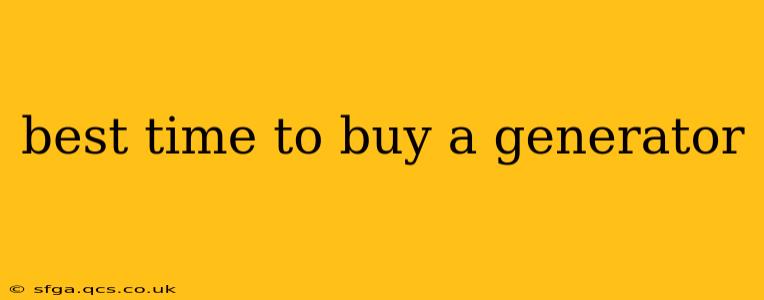Buying a generator is a significant investment, whether for home backup power, recreational use, or professional applications. Timing your purchase strategically can save you considerable money. This guide explores the optimal times to buy a generator, considering factors like seasonal demand, sales events, and product cycles.
What are the best months to buy a generator?
Generally, the best time to buy a generator is during the off-season. This typically falls between late fall and early spring. Demand is lower during these months, leading to better prices and potentially more negotiation power. Conversely, the worst time to buy a generator is typically right before or during hurricane season (June-November in the Atlantic) or severe winter weather events.
When are generators on sale?
Several periods throughout the year often feature generator sales:
- Black Friday and Cyber Monday: These post-Thanksgiving shopping extravaganzas frequently include significant discounts on generators from various retailers, both online and in physical stores.
- Memorial Day, Labor Day, and Fourth of July Sales: These summer holidays often see retailers offering promotions on outdoor power equipment, which frequently includes generators.
- End-of-Season Sales: As the weather changes and demand shifts, retailers may offer clearance sales on generators to make room for newer models. This often happens in late fall and early spring.
- Manufacturer Rebates: Check the websites of major generator manufacturers for potential rebates or special offers.
What factors influence generator pricing besides the time of year?
Several factors beyond the time of year influence generator pricing:
- Generator Type: Portable generators are generally less expensive than standby generators. The power output (measured in watts or kilowatts) also significantly impacts price. Larger generators with more power will naturally cost more.
- Features: Features like fuel efficiency, noise reduction technology, and remote start capabilities add to the cost.
- Brand: Established brands with strong reputations often command higher prices than lesser-known brands.
- Retailer: Prices can vary between retailers, so it's crucial to compare prices from multiple sources before making a purchase.
How do I find the best deals on generators?
Finding the best deal requires research and patience:
- Compare Prices: Use online price comparison tools to find the lowest price for the specific generator model you're interested in.
- Check for Coupons and Promo Codes: Look for online coupon sites for potential discounts on generators.
- Negotiate: Don't hesitate to negotiate with retailers, especially during the off-season or when purchasing multiple items.
- Consider Refurbished or Used Generators: For budget-conscious buyers, a refurbished or used generator in good condition can be a cost-effective option, but carefully inspect it before purchasing.
What should I consider before buying a generator?
Before purchasing a generator, consider the following:
- Power Needs: Determine the wattage requirements of the appliances and devices you plan to power.
- Run Time: Consider how long you need the generator to run. Fuel capacity directly impacts run time.
- Fuel Type: Generators run on gasoline, propane, or natural gas. Each fuel type has pros and cons concerning cost, availability, and environmental impact.
- Noise Levels: If noise is a concern (e.g., for residential use), look for quieter generators.
- Installation Requirements: Standby generators require professional installation.
By carefully considering these factors and timing your purchase strategically, you can find the best time to buy a generator and secure a great deal. Remember that thorough research and careful consideration of your individual needs are paramount to making an informed and cost-effective decision.
